Learning and knowledge sharing are fundamental to the LHSS Project. We invite you to search LHSS knowledge products and resources for the latest approaches, insights, and learning in the field of integrated health systems strengthening.
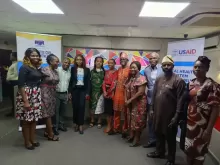
The Lagos State Civil Society Participation for Development (LACSOP) with support from LHSS held a budget consultative forum with civil society organizations across the state to discuss key recommendations for the Lagos State 2024 health budget.

Improved internet connectivity and capacity strengthening have increased timeliness and completeness of health data reporting in Timor-Leste. That makes all the difference for the country’s health officers.
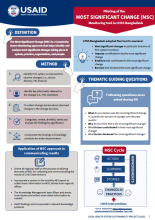
The Most Significant Change (MSC) is a complexity-aware monitoring approach that helps us track and understand important changes happening in systems, practices, organizations, and people. LHSS Bangladesh has applied this MSC tool to identify, evaluate, and understand the most substantial changes within our primary health care system functions.
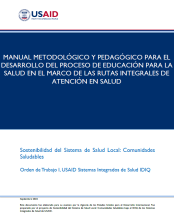
This methodological and pedagogical manual offers guidelines for the development of the Health Education (EpS) process within the framework of the Comprehensive Health Care Routes (RIAS). These routes represent a significant shift in Colombia's public health policy by prioritizing health education.
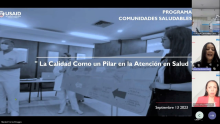
In this space, the experience of the Ministry of Health of Colombia, the quality improvement pathway in the Capital District, and the contributions of LHSS Colombia to health quality improvement were presented.
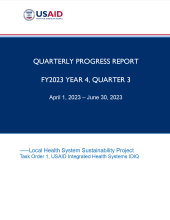
This Year 4 Quarter 3 Report (Apr-Jun 2023) was prepared for USAID and provides a progress update for all annual work plan activities.
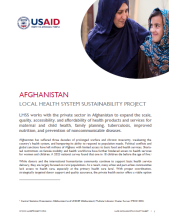
LHSS works with the private sector in Afghanistan to expand the scale, quality, accessibility, and affordability of health products and services for maternal and child health, family planning, tuberculosis, improved nutrition, and prevention of noncommunicable diseases.
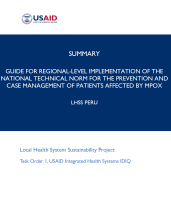
The English Summary for this report described the purpose of this guide which is to facilitate the implementation of Technical Health Standard N°191-MINSA/DGIESP-2022 for the prevention and management of patients affected by Mpox at the subnational level. This operational guide aims to ensure the effective implementation of the provisions established in the technical standard, to benefit the affected population and ensure access to appropriate services.
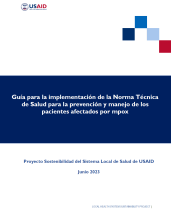
La presente guía tiene como objetivo principal facilitar la implementación de la Norma Técnica de Salud N°191-MINSA/DGIESP-2022 para la prevención y manejo de los pacientes afectados por Mpox a nivel subnacional. Esta guía operativa busca asegurar la efectiva puesta en práctica de las disposiciones establecidas en la norma técnica, con el fin de beneficiar a la población afectada y garantizar el acceso a servicios adecuados.
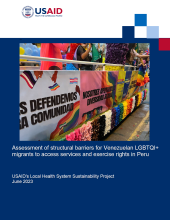
This report aims to delve deeper into comprehending the functioning of the social protection system and the interventions carried out by civil society, particularly concerning the Venezuelan LGBTQI+ migrant and refugee population in Peru. Additionally, it strives to uncover the obstacles that hinder their access to crucial services.
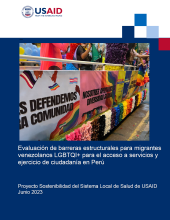
El objetivo de este reporte es profundizar en la comprensión del funcionamiento del sistema de protección público y las acciones emprendidas por la sociedad civil, en relación con la población migrante y refugiada LGBTQI+ proveniente de Venezuela en el territorio peruano.
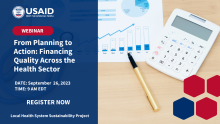
LHSS along with speakers from USAID and WHO reflected on strategies to ensure reliable funding for costing the planning, design, implementation, and evaluation of a National Quality Policy and Strategy (NQPS).
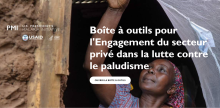
La boîte à outils vise à combler une lacune dans les conseils pratiques pour l’EPS dans les programmes de lutte contre le paludisme. Il contient des orientations, des ressources et des exemples étape par étape pour développer des activités d’ESP, dans le but global d’équiper les acteurs au niveau des pays pour stimuler une plus grande participation du secteur privé à la lutte et à l’élimination du paludisme et contribuer à des résultats durables au niveau local. La boîte à outils est disponible en anglais et en frech.
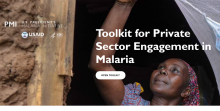
The toolkit aims to address a gap in practical guidance for PSE in malaria programming. It contains step-by-step guidance, resources, and examples for developing PSE activities, with the overall goal of equipping country-level actors to stimulate greater private sector participation in malaria control and elimination and contribute to locally sustained results. The toolkit is available in English and French.
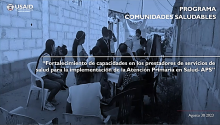
A brief introduction to Primary Health Care (PHC) was presented, along with the tools for PHC implementation developed in collaboration with the Ministry of Health and local health authorities.
